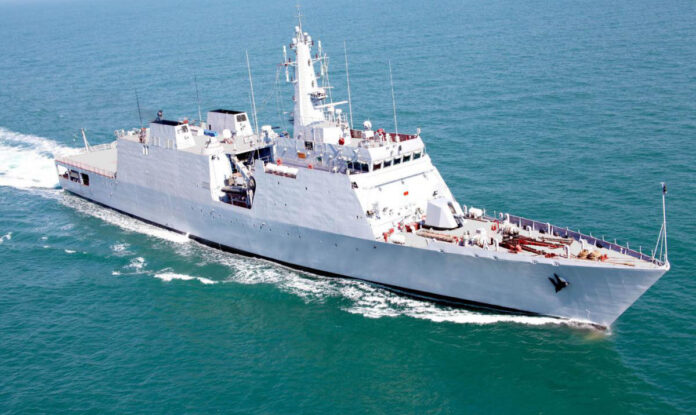NEW DELHI: India is deepening its defense ties with the Middle East, experts said on Sunday, following a number of recent security engagements with Gulf countries.
In the past few weeks alone, Indian forces have engaged with their counterparts in the UAE, Saudi Arabia and Oman.
On Feb. 20, INS Sumedha, a patrol vessel of the Indian Navy, arrived in Abu Dhabi to participate in the Naval Defense Exhibition and International Defense Exhibition.
A week later, eight fighters, tankers and transport planes of the Indian Air Force were extended hospitality by the Royal Saudi Air Force for refueling and interaction with Saudi airmen.
On Feb. 28, an Indian submarine made a call for an operational turnaround in the Salalah port of Oman.
Indian defense engagements with the Middle East have been on the rise for the past few years but have deepened lately as the US is downsizing its presence in the region.
“The US is minimizing its security role in the region and there is a vacuum,” said Zakir Hussain, a Middle East expert and former fellow of the Indian Council of World Affairs in New Delhi.
One of the reasons India is trying to fill this “vacuum” is also to balance the influence of its rival China.
“The China factor is playing a key role in attracting India to engage in defense and security affairs,” Hussain told Arab News. “China is a growing influence in the region. It has (prompted) India also to increase its presence.”
But the three Gulf countries are important to India also due to geostrategic reasons, with access to their ports.
“The 21st century is known as the maritime century, and if India is not increasing defense cooperation with these countries, then merely economic cooperation is not going to succeed,” Hussain added. “It is not surprising, and it is the demand of the time.”
For defense expert and senior journalist Ranjit Kumar, the relationship between India and Gulf countries was like one of “distant neighbors,” while now is the time to “play a bigger role.”
Kumar said: “Till now, Arab countries have aligned with either the American or Russian camp. Now, both of them have already started withdrawing from the area. The Arab world finds India a natural partner.”
Security engagements are also vital for India’s huge diaspora residing in the region.Nearly 9 million Indians live and work in the Middle East, with some 3.4 million in the UAE and 2.5 million in Saudi Arabia, and send back home about $80 billion in remittances every year.
“The Arab world is a major source of remittance revenue for the Indian economy. That reason is also important in this context,” Kumar said.
“India needs peace and stability in that region for the welfare of the overseas Indians and its economy.”
The increased security cooperation is also reflecting diplomatic efforts and the strengthening of bilateral ties, especially with Saudi Arabia.
“Military diplomacy is extremely important between India and Saudi Arabia…All the three services in India now are engaging with Saudi Arabia in defense, which is an extremely important moment for bilateral ties between the two countries,” said Kabir Taneja, strategic studies fellow and Middle East expert at the Observer Research Foundation in New Delhi.
“Defense ties are always a good barometer to see how bilateral ties are going between two states. Defense is something that is important for India and it’s also very critically important for West Asia.”
He sees the increasing defense engagements as aligned with changing economic relations. India, he said, wishes to change the perception that it is a country that solely provides labor for development projects in the Middle East.
“India wants to be seen as an investor, as an economic power where the big sovereign funds of the region like Saudi Arabia, Qatar, UAE are attracted to India as an economy,” Taneja said.
“The Arab world is important for India economically right now…and India’s economy is now very attractive to Gulf investments.”

